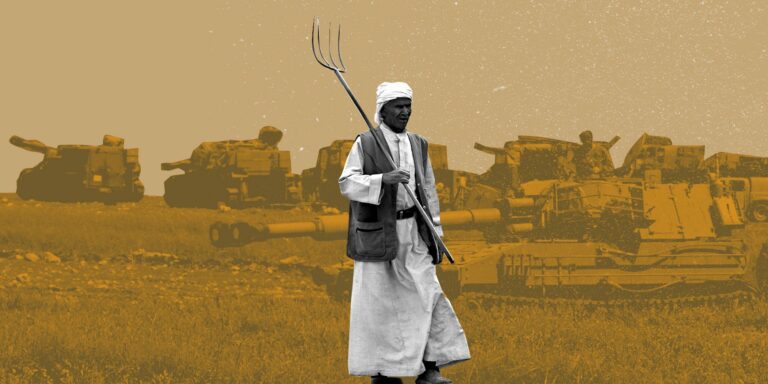From far away, you can only see their straw hats and colorful dresses moving through beanpoles and zucchini groves. Every day, these Syrian women hunker down to work the land in the Beqaa Valley, the sunlight scintillating on their skins and faces. The plains renew themselves. The crops are varied. But the days are the same for these women: they go out to the plains at dawn and return to their camps at sunset.
Um-Mahmoud is a woman in her eighties. According to her friends, she is tough, fast and her work is unlike anyone else’s. Um-Mahmoud wakes up at dawn with the Azan sound, prays, and gets ready for her day. She leaves her tools and her hat outside the tent where she lives with her sons and grandchildren in a Syrian refugee camp in the Beqaa Valley. With one hand on her hip, she shoulders the tools and joins the other women where they all wait for the sergeant to give them a ride to the plains. A woman of few words, Um-Mahmoud prefers not to be photographed.The old lady stays quiet on those daily trips. “I’ve been working here for 60 years.” she says. She dons her hat and walks out into the plains with her comrades. As soon as they reach the land, Um-Mahmoud begins work without waiting for any instruction. She does not need any. She has been doing this for a long time. From a distance, Essam, the landowner, watches and listens to Um-Mahmoud sing all day. He looks at me and says: “I’m 40 years old now, and for 40 years I’ve been hearing her singing here in the plains.
A Brief Historical Overview
In the late 1960s-early 1970s, Syrian labour began to flow into the Beqaa Valley. Thanks to the difference in prices and currency exchange, the profitable phenomenon of seasonal agricultural workers saw a number of men and their families set up camp near the cultivated lands. During that time, the camps and worksites remained in the region only during the summer high season, after which workers returned to Syria, where work picks up in winter.
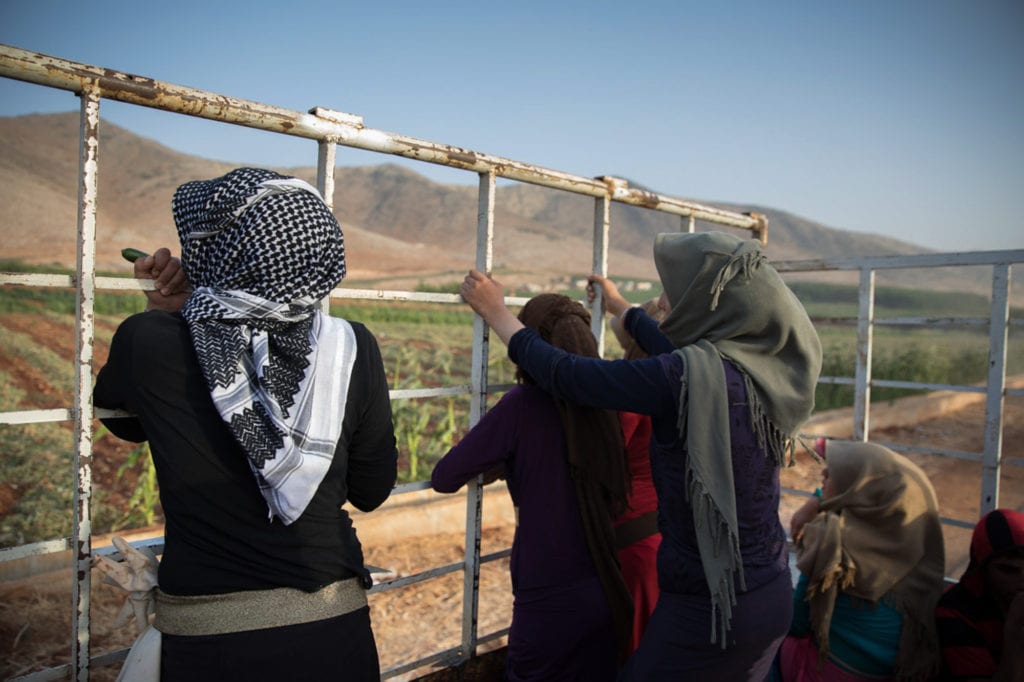
Things changed in the 1990s. With the economic crisis that saw the Lebanese pound lose value, Meager wages led to a massive increase of internal migration of Lebanese workers from the countryside to the city, opening the way for Syrian workers to take their place. In addition to agriculture, labor expanded to include construction work as well. For Syrians, the wages were sufficient to make ends meet. Back in Syria, many were capable of meeting their basic needs of medication, food and clothing in Syria.
Today, given the current circumstances, the farm workers’ wages are insufficient, and a raise is out of the question
With the ongoing war in Syria, the situation is different. The number of Syrian refugees who fled to Lebanon has increased monumentally.
Now, whole families, not just individuals, move to Lebanon seeking a permanent residence. Most are in dire financial situations and, with the spike in cost of living in Syria, whatever they make in Lebanon is not enough to get by anymore. An enormous number of refugees cannot meet their basic needs in Syria. At this time, jobs that are not limited to agriculture and construction anymore, include many sectors that went hand in hand with a societal change and the nature of the work that the Lebanese sought. In the Lebanese agricultural sector, Syrian labour has increased considerably, and Syrian refugee women have become an essential part of it. Sanaa (24) says: “In Syria, we used to not work, we had ten sheep around the house, and men, my father and my three brothers, went to Lebanon to work during the high season, and returned home afterward. But after we sought asylum here, it is the women who work while men stay at home doing nothing.”
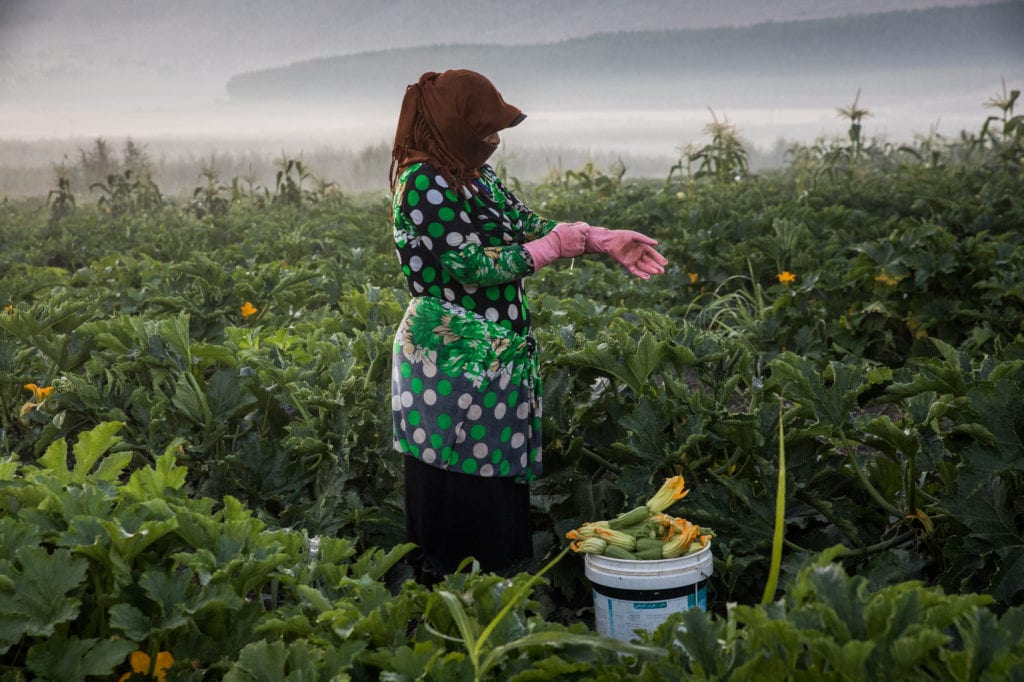

Day labourers: Syrian Girls and Women
Most Syrian families who settled in the Beqaa valley work in agriculture, especially girls and women, for this type of work is considered not suitable for men. They now work all year long, with pressure increasing during spring and summer high season, which starts in April and ends in September. In the six winter months of the year, these families live on “season” remains. Aman (33) said: “We work seven days a week, especially in the high season―that is, about six months―and if we get sick, we can rest one or two days, then we are required to return directly to work.”
Fatima (15 ) started working in the plains three years ago, when she first got her period. And she is not alone. All refugee girls work in agriculture. Fatima works almost 10 hours a day and sometimes more, depending on the nature and the pressure they face during the high season. Most girls start their day in the early morning and never finish before 7 PM. “We started working today at 5 AM. and we finished at 7 PM. We worked in the fields of vigna and cucumbers that sometimes belonged to a single landlord and sometimes many.” The pace of work during the day varies according to the nature of the field or the land and according to what must be sent to the market. Sweet potatoes should be kept for two days before being sent out, while vigna should be brought directly to the market. The merchant’s pickup truck waits for them right next to the plain.
Every day, early in the morning, the ‘sergeant’ arrives in a huge pick-up truck to take them to the plains, after notifying them the previous evening of the time they should gather at the entrance of the camp, and wait for his arrival. The number of girls and the level of experience wanted vary according to the landlords’ request, and the type of work needed for the day. Some of them are better at picking cucumbers; others, zucchini. But the girls do not really get to choose the crop to work on: “I like to work the zucchini season, tomatoes and corn. I hate turnip picking, because it’s in winter and the weather is freezing. But we don’t have a say in this. The sergeant doesn’t allow us to choose and we have to do what he demands without protest.” Fatima said.
Wages are fixed for all women and girls living in the camps: 8,000 Lebanese pounds for every 5 working hours. With the Lebanese currency depreciation and in the light of the severe financial crisis, that is the equivalent to 50 cents an hour.
Usually ‘the sergeant’ gets a commision of 2000 LBP out of their daily wage, so women go back to their tents with the remaining 6000. But for those who live outside the camp, they can keep the whole 8000. The daily wage may increase according to the number of boxes they fill: for every 6 boxes, they get an extra 6000, i.e. a full wage. Still, given the current economic condition in Lebanon, and the dire living conditions of Syrian refugees, this wage is hardly enough. “There are many workers in need of a job,” says Warda, 42, “if you quit, they’ll find someone else. We asked for a raise, we wanted 8000 instead of 6000, but due to the abundance of Syrian workers, they refused”.
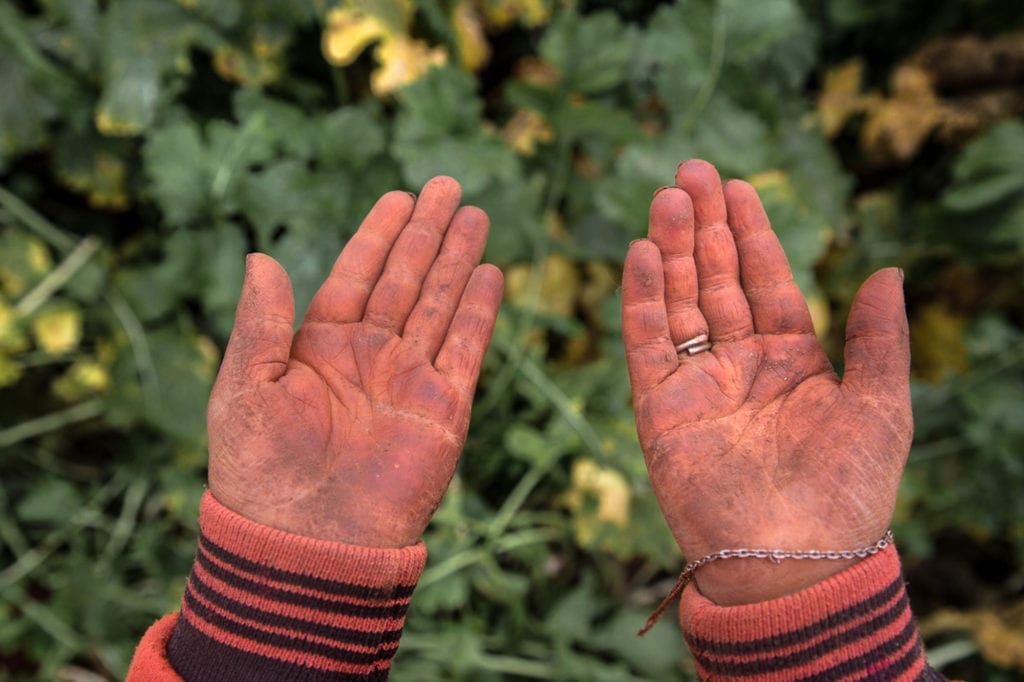

The Sergeant and The Landowner
I paid the Beqaa valley a visit in the summer and spent days with them. I noticed a complete hierarchy governing the daily agricultural process in the valley: There is the landowner, the ‘sergeant’, the agent, the women and girls, the merchant, then the husbands. The women and girls work while several parties around keep giving them orders.
Essam, a man in his forties, owns one of the plains. He inherited this large property from his father, who in turn had inherited it from his grandfather. His complexion is dark from so much sun. He starts work at dawn and keeps going until he is done with the day’s work, in the afternoon or the evening. He supervises every detail throughout the day, and wherever reaping is finished, he turns on his tractor, lights a cigarette, and plows another patch for cultivation. At sunset, the work stops, and the water sprinklers erupt to irrigate the land. Essam does not deal directly with the women, but relays his instructions via the camp’s ‘sergeant’. He informs the latter of the number of workers needed for a certain reaping process, so that they would be ready the next day. In his experience, the sergeant does not always always fulfill his needs.
Essam has worked the land since he was young. He used to watch his grandfather, then he started working with his father. During his grandfather’s time, there were no foreign workers. They started coming in during his father’s time, in the seventies, and gradually they increased until the Lebanese workers totally disappeared. Remarkably, no contracts are ever signed. The sergeant says agreements are made verbally. Essam believes ethics are the basis for such dealings.
The main supervisor of the women’s work in the valley, in addition to his task of counting the boxes filled by each worker, is the agent, who is appointed by the sergeant. The agent is the primary supervisor who oversees all work. He makes sure each cucumber is placed in a box, and sends home whoever makes a mistake. “We only get a five-minute break, then we go right back to work,” said Aman. “Our first break is at 10 a.m., for 5 minutes, we drink some water and we start again. We don’t stop working unless the agent allows us”.
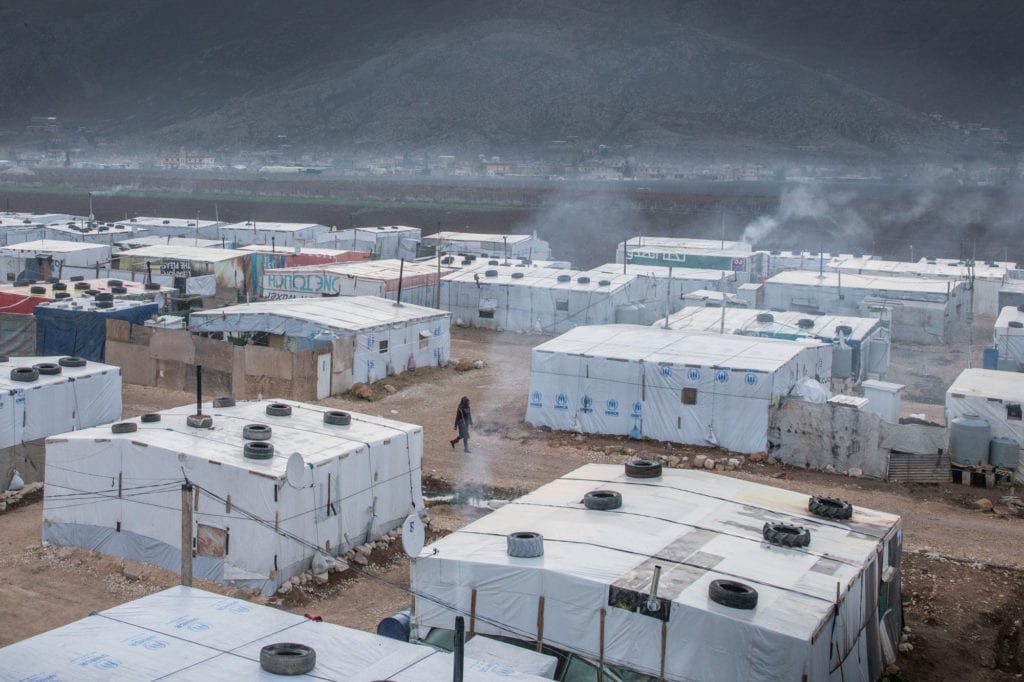

What are the women’s working conditions?
Essam complained that “working with women is very hard. They’re slow. They usually waste time to get paid for extra hours.” Sometimes, the landowner yells at them himself, when the agent’s remonstrances do not get things done. When things get tough, especially when there is a personal problem with one of the women, the sergeant directly intervenes. Sanaa says, “Landowners always yell at us, and talk to us harshly. If any physical abuse happens, we complain to our fathers or brothers, who talk to the sergeant, and he, in turn, talks to the owner or the agent. Sometimes we go directly to the sergeant, who insists that yelling or violence must be avoided at work”.
“There are varied reasons for yelling”, she added, “It could be a very simple mistake, such as an imperfection in weeding. We feel humiliated in such cases, but we are compelled to endure. We need to work. We want to earn a living, there’s no other alternative, if we don’t like it, we can leave, and no one will care. Our choices are limited, if we had other choices, we wouldn’t have stayed in the valley until now.”
For his part, the sergeant says that the problems are usually solved quickly, through communication and dialogue, and they never resorted to violence. “That never happens,” he says. But some women contradict him, they say that the landowner sometimes beats the girls”.
Today, given the current circumstances, the farm workers’ wages are insufficient. But a raise is out of the question, according to him, especially that the Lebanese state does not subsidize nor offer any protection for farmers, so he is in constant danger of bankruptcy. Fertilizers, machines, fuel and wages are rising, while the prices of vegetables and fruits remain the same.
Those who object to the wages, they get the reply: “Leave, we’ll get another worker, and for less money”. Although work is tough, they are forced to endure and keep quiet, in order to earn a living, pay the bills. One of the main reasons for women to do this type of work is that men consider farming a “woman’s job.” Men work in other fields, like construction, transport and companies, and there is no place for them on Lebanese farms.



